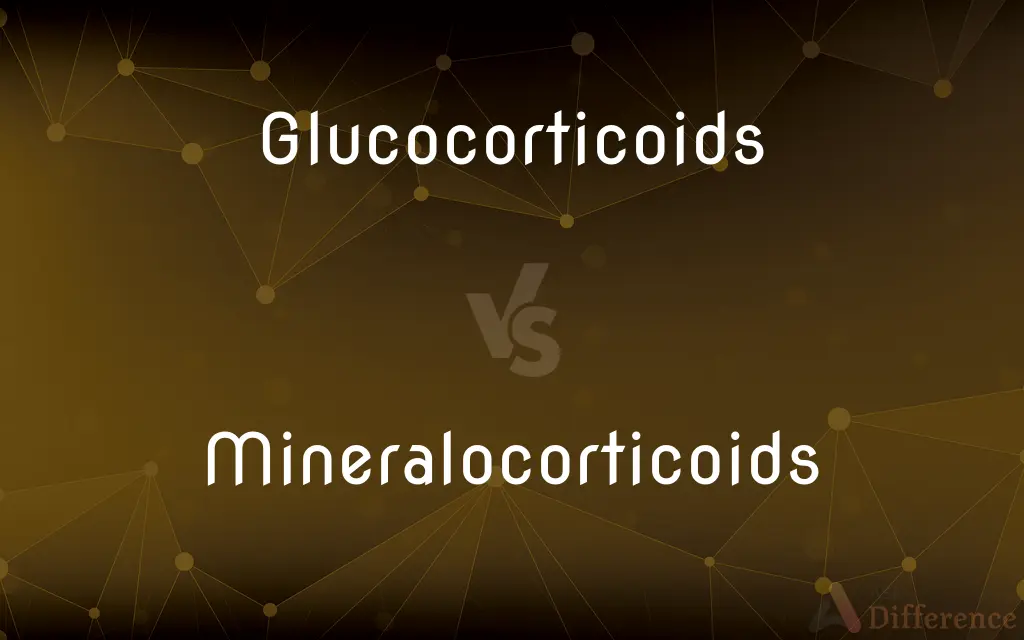Glucocorticoids vs. Mineralocorticoids — What's the Difference?
By Maham Liaqat & Urooj Arif — Published on July 19, 2024
Glucocorticoids are a class of corticosteroids involved in glucose metabolism and immune response modulation, while mineralocorticoids, like aldosterone, primarily regulate sodium and water balance in the body.

Difference Between Glucocorticoids and Mineralocorticoids
Table of Contents
ADVERTISEMENT
Key Differences
Glucocorticoids and mineralocorticoids are two types of corticosteroids produced by the adrenal cortex, each serving distinct physiological roles. Glucocorticoids, such as cortisol, are crucial in regulating the body's response to stress, influencing glucose metabolism, and modulating the immune system. They help in increasing blood glucose levels through gluconeogenesis, reducing inflammation, and affecting lipid and protein metabolism.
Mineralocorticoids, with aldosterone being the most prominent, play a key role in maintaining electrolyte and fluid balance. They act primarily on the kidneys to promote sodium retention and potassium excretion, which indirectly controls water retention, blood volume, and blood pressure. The balance of sodium and potassium is vital for proper cellular function, and mineralocorticoids ensure this equilibrium is maintained.
Both glucocorticoids and mineralocorticoids are steroid hormones synthesized from cholesterol, but their targets and mechanisms of action differ significantly. Glucocorticoids exert their effects on nearly all body tissues, influencing a wide range of physiological processes, including stress response, immune function, and metabolism. In contrast, mineralocorticoids are more specialized, primarily affecting the renal system.
The regulation of these hormones is also distinct. Glucocorticoid secretion is primarily controlled by the hypothalamic-pituitary-adrenal (HPA) axis through the release of corticotropin-releasing hormone (CRH) and adrenocorticotropic hormone (ACTH), which responds to stress and circadian rhythms. Mineralocorticoid release, on the other hand, is largely regulated by the renin-angiotensin-aldosterone system (RAAS), which responds to changes in blood pressure and plasma sodium concentration.
Both glucocorticoids and mineralocorticoids are essential for maintaining homeostasis, while their functions, target tissues, and regulatory mechanisms are distinct. Glucocorticoids have broad effects on metabolism and the immune system, while mineralocorticoids are focused on regulating electrolyte and fluid balance.
ADVERTISEMENT
Comparison Chart
Primary Functions
Regulate glucose metabolism, immune response, and stress response.
Regulate sodium and water balance, affecting blood volume and pressure.
Key Hormones
Cortisol.
Aldosterone.
Target Tissues
Nearly all body tissues.
Mainly the kidneys.
Physiological Effects
Increase blood glucose, reduce inflammation, affect lipid and protein metabolism.
Promote sodium retention and potassium excretion in the kidneys.
Regulation
Controlled by the HPA axis in response to stress and circadian rhythms.
Regulated by the RAAS in response to blood pressure and plasma sodium levels.
Clinical Use
Used to treat inflammation, autoimmune diseases, and allergies.
Used to treat conditions like Addison's disease and certain forms of hypertension.
Compare with Definitions
Glucocorticoids
Used in medicine to treat inflammation.
Prednisone, a synthetic glucocorticoid, is prescribed for severe allergic reactions.
Mineralocorticoids
Hormones that regulate electrolyte and fluid balance.
Aldosterone, a mineralocorticoid, controls sodium retention in the kidneys.
Glucocorticoids
Affect protein and fat metabolism.
Glucocorticoid therapy can lead to muscle breakdown and fat redistribution.
Mineralocorticoids
Act mainly on the renal system.
Mineralocorticoids cause the kidneys to excrete potassium and retain sodium.
Glucocorticoids
Modulate the body's stress response.
Glucocorticoids are released in response to both physical and emotional stress.
Mineralocorticoids
Can lead to hypertension if overproduced.
Excessive mineralocorticoid activity is associated with high blood pressure.
Glucocorticoids
Influence blood glucose levels.
Glucocorticoids are involved in increasing glucose availability during fasting.
Mineralocorticoids
Involved in the RAAS pathway.
A drop in blood pressure triggers the release of aldosterone, a key mineralocorticoid.
Glucocorticoids
Steroid hormones that regulate metabolism and immune response.
Cortisol, a glucocorticoid, helps the body respond to stress.
Mineralocorticoids
Essential for blood pressure regulation.
Mineralocorticoids help maintain blood volume and pressure through sodium conservation.
Glucocorticoids
Any of a group of steroid hormones, such as cortisol, that are produced by the adrenal cortex, are involved in carbohydrate, protein, and fat metabolism, and have anti-inflammatory properties.
Mineralocorticoids
Any of a group of steroid hormones, such as aldosterone, that are secreted by the adrenal cortex and regulate the balance of water and electrolytes in the body.
Glucocorticoids
Plural of glucocorticoid
Mineralocorticoids
Plural of mineralocorticoid
Common Curiosities
Can glucocorticoids and mineralocorticoids be used as treatments?
Yes, glucocorticoids are used to treat inflammatory and autoimmune conditions, and mineralocorticoids are used for conditions like Addison's disease and specific types of hypertension.
What are the main differences between glucocorticoids and mineralocorticoids?
Glucocorticoids primarily affect glucose metabolism and the immune system, while mineralocorticoids regulate electrolyte and fluid balance.
What happens if there's an imbalance in glucocorticoids or mineralocorticoids?
An imbalance can lead to health issues, such as Cushing's syndrome from too much glucocorticoid activity or Addison's disease from insufficient aldosterone.
What is the renin-angiotensin-aldosterone system (RAAS)?
It's a hormone system that regulates blood pressure and fluid balance by controlling the constriction of blood vessels and the volume of circulating blood.
How do glucocorticoids affect the immune system?
They suppress the immune response, reducing inflammation and the activity of the immune system.
What role does aldosterone play in the body?
Aldosterone regulates sodium and water balance, which is essential for maintaining blood volume and blood pressure.
How are glucocorticoids and mineralocorticoids regulated?
Glucocorticoids are regulated by the HPA axis, responding to stress and circadian rhythms, while mineralocorticoids are regulated by the RAAS, responding to blood pressure and sodium levels.
Are there synthetic versions of these hormones?
Yes, synthetic glucocorticoids and mineralocorticoids are used to treat various conditions, mimicking the effects of naturally occurring hormones.
Can someone have a disorder affecting both glucocorticoids and mineralocorticoids?
Yes, disorders of the adrenal gland can impact the production of both types of hormones, affecting a wide range of bodily functions.
How does stress affect glucocorticoid levels?
Stress triggers an increase in glucocorticoid levels, particularly cortisol, preparing the body to respond to challenging situations.
Share Your Discovery

Previous Comparison
Nurse Crop vs. Cover Crop
Next Comparison
Social Change vs. Cultural ChangeAuthor Spotlight
Written by
Maham LiaqatCo-written by
Urooj ArifUrooj is a skilled content writer at Ask Difference, known for her exceptional ability to simplify complex topics into engaging and informative content. With a passion for research and a flair for clear, concise writing, she consistently delivers articles that resonate with our diverse audience.














































